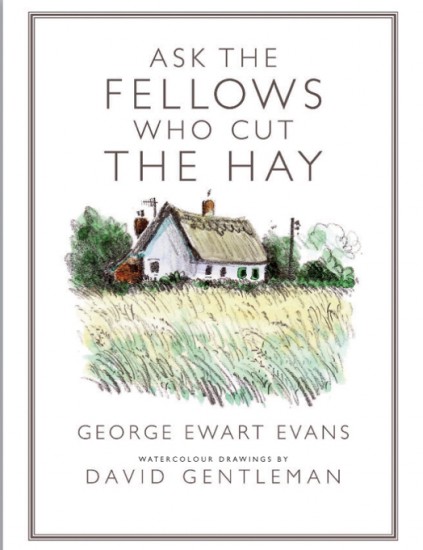
Ask The Fellows Who Cut The Hay (Full Circle Editions ) by George Ewart Evans
Review by Richard King.
Romanticising our industrial heritage is an easy and often pleasurable trap to fall into. Like dreaming about what might have happened if Brian Clough had coached the national team, or wondering in awe at the scale of desire in Freddie Trueman’s dark heart, as he blew apart the officer class county sides.
Manchester, a city not known for its civic modesty, takes great stock in tracing its cultural capital through a bloodline that starts with Engel’s stay in the city while writing ‘The Condition Of The Working Class In England’. Something similar happens in our race memory of the great shipyards of the Clyde or the forges of the Midlands and the North East. In Wales, despite the premature deaths of its forefathers to emphysema, a cursory pub chat about the pithead libraries and the birth of the NHS makes the dragon roar. Sentimentality aside, this is our inheritance. No wonder such displays of community and fellowship summon up a strange nostalgia for organised labour, whatever the realities of the working conditions and lives. Today, in this atomised age we hear the word community in relation to the internet; or in an attempt to define an area’s collective sense of grief or shock.
Blame it on Sunday evening television or The Archers, but rural Britain is continually characterised as paradise lost, an Eden of enclosures and gentle hierarchies. It’s a place that last really existed in John Major’s attempts, in misquoting Orwell, to define an imaginary moral landscape. And look where that got him. We may feel connected to our urban inheritance, but to many, the countryside, and its ways of life are a broadsheet property supplement fantasia.
George Ewart Evans escaped the poverty of Wales with his wife Ellen in the 1940s. Ellen became headmistress of Blaxhall village school in Suffolk, and George, by all accounts an introverted man prone to depression, gave up his job as a teacher in order to write. A former member of the Communist party who practised yoga, Ewart Evans was astonished by the depth of memory and collective awareness of the past in the village, and set about recording an oral history of Blaxhall. These anecdotes became the astonishing Ask The Fellows Who Cut The Hay, a work of intensely detailed field research that places Ewart Evans alongside Cecil Sharp as a founding father of the folklorist movement.
In Ask The Fellows Who Cut The Hay, though first published in 1956, Ewart Evans uses the personal testimonies of the village to bring to life the era of the horse and cart. We meet the shepherd Robert Savage, his wife Priscilla, two old farmers, one Henry Puttock, a bell ringer, and Katie Messenger who cleaned the school and cared for its children. When Ewart Evans listened to the life stories of the elderly Joe Row he was sitting down with a man: “who could recall accurately and at will, dates and events from the last quarter of the nineteenth century”. A life long regular at the village pub, Row sang Ewart Evans ‘the ritual song for New Year’s Eve at the Ship Inn’
By recording the lives of these people we gain an insight into the rural economy from the backhouse boy up. Instead of the curate or teacher, we meet the people who worked with, and for them. This is a universal perspective of rural life, free from the coincidences of Thomas Hardy or the manners and morality of the Edwardian novelists, and free from the delusions of ‘the country’, wherever that is.
Ask The Fellows Who Cut The Hay is not without romance. In the final chapter Ewart Evans celebrates the folk tales, superstitions and old customs of Blaxhall and dwells carefully on the dignity of the local practice of smuggling: ‘In our district for example some of the most active members of the notorious Sizewell Gap Gang were farmer’s sons and small tradesmen. Their chief enemy was according to type: he was Squire Shepherd who owned a very large estate including most of this village. He was also a magistrate.’ Ewart Evans was convinced the locals needed to take charge of their economy and wrest away control from the authoritarian revenue and its patrons in the land owning class. Smuggling also provided some thrills: ‘About this time it was said in Parliament that ‘all the young clever fellows in Suffolk are employed by smugglers, and have half-a-crown a day while waiting; and when on horseback, they have a guinea a day and are well entertained.”
As a nation, we’ve always been on the blag.
This edition contains some beautiful watercolours and drawings by David Gentleman who first met Ewart Evans in the sixties, these pictures, along with Ewart Evans’ fondness for including lists and inventories, give the book the feeling of a utilitarian Baedeker. Though it can’t do anything about the fact that all we’re left with of William Morris’ utopian socialism is posh wallpaper, Ask The Fellows Who Cut The Hay reminds us, right down to the dirt underneath our fingernails, what a strange and remarkable place this country of ours can be.
‘Ask The Fellows Who Cut The Hay’ is now on sale in the Caught by the River shop, priced £20.00